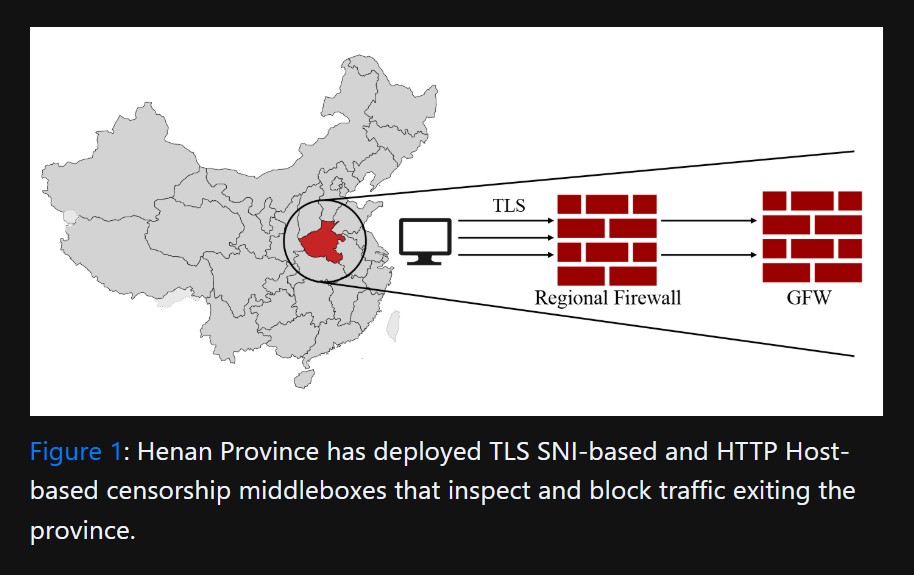Henan Province in China Quietly Imposes Stricter Internet Controls Than the Rest of the Country
Over the past 18 months, internet users in China’s Henan province have faced significantly harsher online restrictions compared to those in other parts of the country, according to a new study by international researchers. The findings, based on daily monitoring of millions of online domains, reveal that Henan enforces a digital firewall far more stringent than China’s already tight national internet controls—prompting fresh concerns over the rise of region-specific censorship.

Figure 1.Internet Controls.
From late 2023 to early 2025, analysts observed that internet traffic originating from cloud servers in Henan experienced unusually high levels of filtering. Their measurements, drawn from a large sample of the world’s most-visited websites, showed that users in Henan encountered access barriers five times more frequently than the average internet user elsewhere in China. Figure 1 shows Internet Controls
Unlike China’s centralized Great Firewall, which operates at a national level, Henan appears to have implemented an additional layer of censorship. This local filter intermittently blocked access to roughly 4.2 million domains—vastly exceeding the estimated 741,000 websites typically restricted across the country. Notably, many of the blocked sites were business-related, covering topics like finance, markets, and economic commentary.
The timeline of these intensified controls aligns with a period of unrest in Henan, particularly following a high-profile banking scandal in 2022. At that time, thousands of residents protested after being unable to withdraw funds from their accounts. In response, local authorities allegedly manipulated COVID-19 health codes to prevent demonstrators from gathering—a move that led to disciplinary actions against some officials. Researchers suggest that the escalation in internet restrictions may have been introduced afterward to prevent similar unrest in the future.
Using direct testing methods from within Henan, the research team tracked the daily behavior of local internet traffic and compared it to trends across other provinces. Although there was a temporary pause in data collection during 2024, results before and after that gap consistently showed far higher censorship levels than in places like Beijing, Shanghai, or Guangdong.
What makes Henan’s case particularly striking is that it is not traditionally viewed as a politically sensitive region like Xinjiang or Tibet, where heightened surveillance is common. Instead, Henan’s aggressive digital filtering may indicate a shift in censorship policy—where enforcement is increasingly tailored to regional events or perceived vulnerabilities rather than purely political risk.
The exact origin of the enhanced restrictions remains uncertain. Analysts believe the measures could either reflect a greater degree of decision-making autonomy at the provincial level or be the result of directives from central authorities responding to local unrest. Officials from Henan’s cyberspace administration have not responded to repeated inquiries for comment.
Meanwhile, on a national scale, China continues to advance its surveillance infrastructure. Recent demonstrations by the Ministry of Public Security showcased tools capable of tracking users on encrypted platforms like Telegram and VPNs. Authorities claimed to have collected tens of billions of messages—signaling a surveillance system that is not only expanding in scope but also becoming more precise through the use of artificial intelligence.
These sophisticated systems, while bolstering government control, may also provide opportunities for digital rights researchers. The same AI tools powering surveillance could potentially be adapted to analyze censorship patterns and uncover weaknesses in filtering systems.
Overall, the findings suggest that internet regulation in China is moving away from a one-size-fits-all model. Provinces like Henan may now serve as testing grounds for localized, adaptive censorship strategies—marking a possible evolution toward a more fragmented and regionally responsive approach to digital control.
Reference:
- https://www.digitalinformationworld.com/2025/05/chinas-henan-province-silently-enforces.html
Cite this article:
Keerthana S (2025), Henan Province in China Quietly Imposes Stricter Internet Controls Than the Rest of the Country, AnaTechMaz, pp.178















